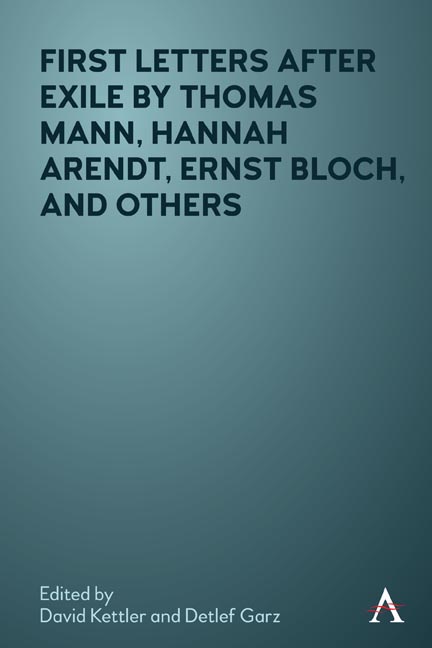Book contents
- Frontmatter
- Contents
- Preface
- Chapter 1 The “First Letters” Exile Project: Introduction
- Chapter 2 “That I Will Return, My Friend, You Do Not Believe Yourself ”: Karl Wolfskehl – Exul Poeta
- Chapter 3 “I Do Not Lift a Stone”: Thomas Mann’s “First Letter” to Walter von Molo
- Chapter 4 Faust Narrative and Impossibility Thesis: Thomas Mann’s Answer to Walter von Molo
- Chapter 5 “That I Am Not Allowed for a Moment to Forget the Ocean of Blood”: Hans-Georg Gadamer and Leo Strauss in Their First Letters after 1946
- Chapter 6 Return into Exile: First Letters to and from Ernst Bloch
- Chapter 7 A Postwar Encounter without Pathos: Otto Kirchheimer’s Critical Response to the New Germany
- Chapter 8 An Exile’s Letter to Old Comrades in Cologne: Wilhelm Sollmann’s Critique of German Social Democracy and Conception of a New Party in Postwar Germany
- Chapter 9 First Letters: Arendt to Heidegger
- Chapter 10 Denazification and Postwar German Philosophy: The Marcuse/Heidegger Correspondence
- Chapter 11 “It Would Be Perhaps a New Exile and Perhaps the Most Painful”: The Theme of Return in Oskar Maria Graf ’s Letters to Hugo Hartung
- Chapter 12 Social Constellation of the Exile at the End of the Second World War and the Pragmatics of the “First Letters”: An Objective Hermeneutic Structural and Sequence Analysis
- Notes on Contributors
- Index
Chapter 12 - Social Constellation of the Exile at the End of the Second World War and the Pragmatics of the “First Letters”: An Objective Hermeneutic Structural and Sequence Analysis
Published online by Cambridge University Press: 25 February 2022
- Frontmatter
- Contents
- Preface
- Chapter 1 The “First Letters” Exile Project: Introduction
- Chapter 2 “That I Will Return, My Friend, You Do Not Believe Yourself ”: Karl Wolfskehl – Exul Poeta
- Chapter 3 “I Do Not Lift a Stone”: Thomas Mann’s “First Letter” to Walter von Molo
- Chapter 4 Faust Narrative and Impossibility Thesis: Thomas Mann’s Answer to Walter von Molo
- Chapter 5 “That I Am Not Allowed for a Moment to Forget the Ocean of Blood”: Hans-Georg Gadamer and Leo Strauss in Their First Letters after 1946
- Chapter 6 Return into Exile: First Letters to and from Ernst Bloch
- Chapter 7 A Postwar Encounter without Pathos: Otto Kirchheimer’s Critical Response to the New Germany
- Chapter 8 An Exile’s Letter to Old Comrades in Cologne: Wilhelm Sollmann’s Critique of German Social Democracy and Conception of a New Party in Postwar Germany
- Chapter 9 First Letters: Arendt to Heidegger
- Chapter 10 Denazification and Postwar German Philosophy: The Marcuse/Heidegger Correspondence
- Chapter 11 “It Would Be Perhaps a New Exile and Perhaps the Most Painful”: The Theme of Return in Oskar Maria Graf ’s Letters to Hugo Hartung
- Chapter 12 Social Constellation of the Exile at the End of the Second World War and the Pragmatics of the “First Letters”: An Objective Hermeneutic Structural and Sequence Analysis
- Notes on Contributors
- Index
Summary
Preliminary Remark
In the analysis of the “First Letters” in the first contact after the end of the Second World War between emigrants from Nazi Germany and their former acquaintances, the problem arises of distinguishing between a stringent, narrow definition of First Letters as documents of an actual initiative to resume old connections and a more comprehensive consideration of the overall communicative maneuvers in dealing with the situation that inevitably occurs when the historical macro-situation compelling exile has ended or has largely disappeared. Even if one wanted to limit the analysis of the phenomenon of First Letters to the initial resumption of contacts in the strict sense, one would first have to analyze the social constellation that is associated with the cessation of the original condition of exile, that is, in this case, with the end of Nazi rule, and this necessarily raises the question of whether exile should continue (and then how?) or be ended by transforming emigration into immigration, on the one hand, or by returning to the country and culture from which one was originally expelled, on the other. For in this constellation, the pragmatics of the First Letters in their strict definition of the initiative of resuming old connections are always necessarily embedded and integrated. For this reason, this will be the first thing to be analyzed here.
The Social Constellation Underlying the Resumption of Old, Preexilic Connections
The Objective Meaning Structure of Exilic Emigration
Socially, exile emigration is of such a nature that it forces a strict analytical distinction between the status of the refugee and the exiled person, a distinction that often falls victim to ideological softening due to the political character of the conditions of exile. Exile in the strict sense of the word can only be spoken of when the exile is expelled and has not fled. Exile always means forced emigration, whereby the compulsion to emigrate is ultimately one that is politically exercised by a system of rule in possession of the state monopoly in the use of force.
- Type
- Chapter
- Information
- Publisher: Anthem PressPrint publication year: 2021

